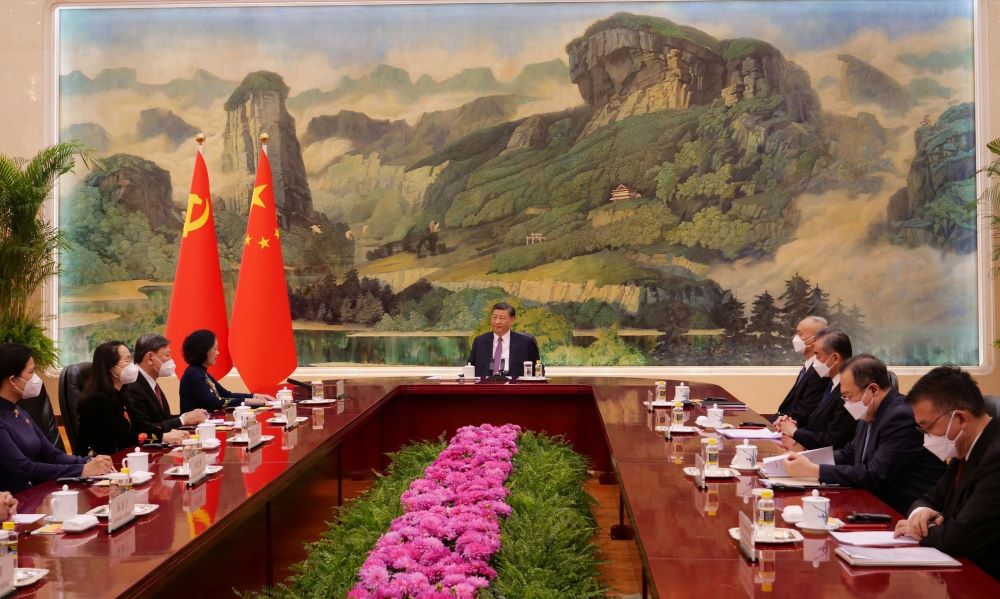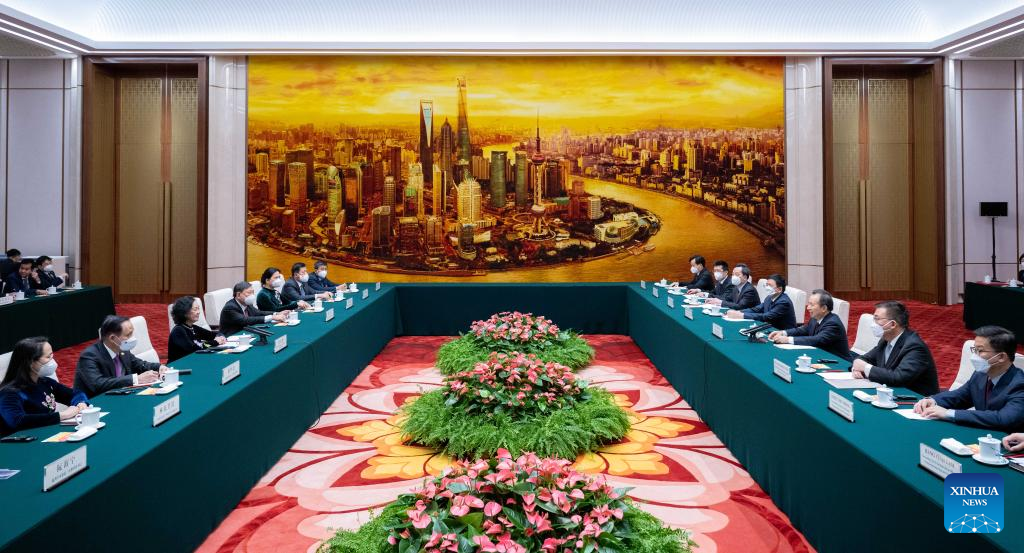Vietnamese Communist Party delegation visits China
The two sides highlighted the thorough implementation of the consensus reached by the top leaders and the political trust between the two parties and states.
A delegation of senior members of the Communist Party of Vietnam (CPV) has arrived in China for a four-day visit at the invitation of the Communist Party of China (CPC) Central Committee.
| Chinese President Xi Jinping receives the high-ranking Vietnamese party delegation led by Truong Thi Mai in Beijing on April 25. Photo: VNA |
The delegation, led by Truong Thi Mai, Politburo member, Permanent member of the CPV Central Committee Secretariat, and Head of the Organization Commission of the CPV Central Committee, was received by Chinese President Xi Jinping on the first day after arriving in Beijing on April 25.
The delegation held talks with Cai Qi, Politburo member and First Secretary of the CPC Central Committee’s Secretariat; and Li Ganjie, Politburo member, Head of the CPC Central Committee’s Organization Department.
At the talks, the two sides highly appreciated the progress in the relations between the two parties and states, especially after CPV General Secretary Nguyen Phu Trong's visit to China in October 2022.
They agreed that the political ties have been reinforced with the exchange of information between top leaders, including secretaries general of the two parties.
In addition, the two countries have prioritized cooperation between parties’ agencies and localities, mainly border areas. Of the fields, they highlighted the people-to-people links and trade relations.
At the meeting with Truong Thi Mai, Xi Jinping noted that this year marks the 15th anniversary of the establishment of a comprehensive strategic partnership between Vietnam and China, expressing his delight at the relationship between the two parties and countries and the readiness to boost the friendship, political trust, and solidarity.
For her part, Truong Thi Mai talked about the willingness to strengthen inter-party exchanges and promote relations between the two parties and countries.
She said the visit is aimed at thoroughly implementing the important consensus reached by the top leaders, especially the Joint Statement on strengthening Vietnam-China Comprehensive Strategic Partnership reached during General Secretary Trong’s visit last year.
| The meeting between the two party delegations led by Truong Thi Mai and Li Ganjie. Photo: Xinhua |
The discussions between Truong Thi Mai and Cai Qi were centered on ways to cooperate in a variety of areas, with a focus on building political trust by increasing high-level exchanges, enhancing the efficiency of cooperation mechanisms, and resolving differences and disagreements.
They also pledged to accelerate significant progress in cooperative fields with a focus on bolstering equitable and sustainable economic cooperation. They agreed to increase inter- and intra-local exchanges while bolstering national defense-security cooperation.
At talks with Li Ganjie, Truong Thi Mai said that China and Vietnam are friendly socialist neighbors connected by rivers and mountains, emphasizing the significance of fostering institutionalized exchanges between the two parties' organizational bodies and pushing for further development of Sino-Vietnamese relations.
After the discussions, the two sides inked a memorandum of understanding on cooperation between the Organization Department of the CPC Central Committee and the Organization Commission of the CPV Central Committee.
At the meetings, Truong Thi Mai suggested that the two sides make efforts to uphold peace and stability, handle disagreements amicably guided by high-level common perception, and persistently settle maritime disputes through peaceful means, in accordance with international law and the 1982 United Nations Convention on the Law of the Sea (UNCLOS), fostering bilateral cooperation and maintaining regional peace and stability.










